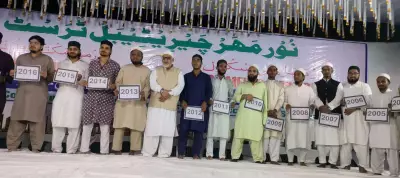
In a world obsessed with outcomes and final scores, the ancient wisdom of Aristotle provides crucial insights for modern professionals facing disappointment and setbacks. From political leaders to sports icons and civil service aspirants, the ethical dimensions of how we approach results versus process reveal fundamental truths about success and fulfillment.
The Universal Challenge: Dealing with Unexpected Outcomes
Recent events across different spheres of Indian life have put the spotlight on how we handle results. The Bihar Assembly Election results, the Women's Cricket World Cup outcomes, and the recently declared UPSC CSE Mains 2025 results all share one common element - they represent moments of triumph and disappointment that test character and resilience.
According to ethics expert Nanditesh Nilay, who published his analysis on November 16, 2025, the true measure of individuals emerges not during victories but in how they respond to setbacks. Purpose becomes the anchor that keeps professionals moving toward their goals when immediate outcomes seem discouraging.
Political Resilience: Beyond Election Cycles
In the political arena, leaders experience constant cycles of victory and defeat. The recent Bihar elections demonstrated how political fortunes can change dramatically. However, ethical leadership isn't defined by a single election result but by consistent commitment to public service and unwavering dedication to political principles.
What makes political leadership remarkable is the five-year timeline between major electoral opportunities. Successful politicians maintain their focus and efforts regardless of immediate outcomes, demonstrating that long-term purpose outweighs short-term results in building meaningful political careers.
Athletic Excellence: Process Over Trophy
The world of sports, particularly the recent Women's Cricket World Cup, offers powerful lessons about ethical commitment to process. While winning tournaments captures headlines, the real story of sporting excellence unfolds in early morning training sessions, disciplined practice routines, and unwavering dedication to the game itself.
The transformation of women's cricket in India illustrates this principle beautifully. Under coach Amol Majumdar's leadership, players from diverse backgrounds - including daughters of carpenters and vegetable sellers - achieved recognition through consistent hard work and talent rather than privilege or connections.
The ethical breakthrough extends beyond the playing field. The Board of Control for Cricket in India (BCCI) now considers providing equal or greater prize money to women cricketers, recognizing that merit and dedication deserve equal reward regardless of gender.
UPSC Journey: Beyond the Final Rank
For UPSC aspirants who received their mains results last week, the emotional rollercoaster of success and disappointment brings Aristotle's philosophy into sharp focus. While cut-offs, ranks, and attempt limits dominate conversations, the transformative journey of preparation ultimately shapes future civil servants more profoundly than any single result.
Ethics becomes more than just a subject in the GS Paper 4 syllabus - it evolves into a discipline of living that influences habits, choices, and value systems. The aspirants who succeed in the long run are those who focus on building qualitative habits rather than obsessing over quantitative outcomes.
Aristotle's Telos: Aligning Purpose with Merit
The ancient Greek philosopher Aristotle provides the foundational framework for understanding why process matters. His concept of telos - the inherent purpose or end goal of any activity - helps determine what truly deserves recognition and reward.
Aristotle's famous flute example illustrates this principle perfectly. If we have excellent flutes, they shouldn't go to the richest people or those who would be happiest owning them. Instead, they should be given to the best flute players because that fulfills the fundamental purpose of the instrument.
This approach applies directly to modern professional contexts. Whether distributing opportunities in sports, political representation, or civil service positions, Aristotle's method encourages us to consider the inherent purpose of each role and reward those best equipped to fulfill that purpose through merit and dedication.
Building Ethical Resilience Across Professions
The common thread connecting politicians, athletes, and UPSC aspirants is their need to maintain motivation, discipline, and consistency when immediate results don't match their efforts. The ethical challenge lies in not abandoning fundamental principles and hard work simply because outcomes aren't immediately encouraging.
As Nanditesh Nilay emphasizes, we need not merely an achievement mindset but an ethical mindset grounded in consistent hard work, discipline, focus, and qualitative habits that enrich life itself. The ancient wisdom that excellence is not an act but a habit remains profoundly relevant in our results-driven contemporary world.
The ultimate lesson for professionals across fields is clear: Know your purpose, honor your process, and let consistent ethical action define your journey rather than being solely driven by immediate outcomes that may not reflect your true worth or potential.





